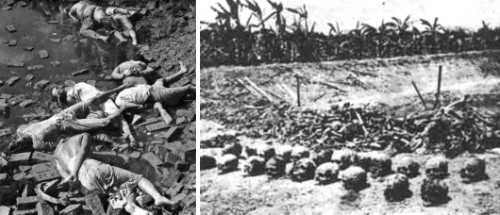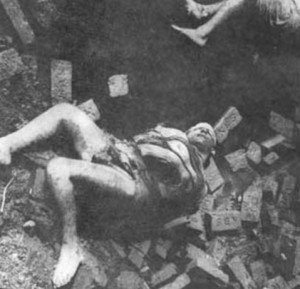|
Current Affairs
Crimes We will never Forgive
The government must initiate the
process of bringing war criminals to book
Ahmede Hussain
 Human bones picked clean by vultures in Khulna. Published in the New York Times on January 24, 1972. |
During our glorious war of liberation against the Pakistani occupation forces, when the country got united against the brutal regime of Yahya Khan and Tikka Khan and took up arms to fight for freedom, a bunch of goons opposed our struggle for independence. Memories are still alive and bleeding, and a casual glance at the copies of newspapers of that time is enough to name the murderers and rapists who, along with the Pakistani army, unleashed a reign of terror against the unarmed population of Bangladesh. The Daily Sangram, the mouthpiece of the Jamaat-e-Islami, has been full of such news; on September 15, 1971, the newspaper reported Motiur Rahman Nizami as saying, “In this hour of national crisis, it is the duty of every razakar to carry out his national duties to eliminate those who are engaged in war against Pakistan.” Not only had Nizami urged fellow Razakars to pick up arms in favour of a marauding Pakistani army who was butchering innocent men and women, the Al-Badr forces, which he headed, killed, tortured and kidnapped people, many could never be found again.
Nizami's crony Ali Ahsan Mohammad Mojaheed, then president of Dhaka unit of East Pakistan Islami Chhatra Shangha, according to a "Fortnightly secret report on the situation in East Pakistan" (the political section of the then East Pakistan home ministry used to send to the head of the government General Yahya Khan), directed his party workers to build Al-Badr Bahini to resist freedom fighters.
It has come to us as shocking when on October 26 this year, Mojaheed, during a visit to the Election Commission, said anti-liberation forces never existed in the country and war crimes never took place in 1971. The comment, preposterous though it is, should have been taken as the ramblings of a degenerated evil mind, had not Shah A Hannan, a former civil servant and Nizami-Mojaheed's crony, on record called Bangladesh's war of liberation a mere civil war: “I know this much that in 1971 there was a civil war...Fine, it was also a Muktijuddha...From what I have read in foreign newspapers and encyclopaedia, it was a civil war and most people did not call it a 'struggle for freedom'.”

These comments, coming from the war criminals and their sympathisers, have raged a storm of protests in the country. The Bangali collaborators have never been pardoned, in the aftermath of our victory against the occupation forces, Nizami-Mojaheed and co. went into hiding to save their skin from the wrath of the ordinary people. A couple of hundred Razakars, Al-Badr and Al-Shams (mostly formed by the members of Jamaat, Nezam-e-Islam and Muslim League) were in jail, awaiting trial for war crimes. After the barbaric events of August 15, 1975, most of these murders and rapists were allowed to go scot-free and Nizami and co. were allowed to do politics again. In fact, in the general elections that were held under Gen Ziaur Rahman, these people did not participate as a political party. It is the apathy and narrow visions of the political parties like the Bangladesh Nationalist Party (BNP) and Awami League (AL) that have given the rebirth of this menace. Gen Zia made a collaborator his prime minister and in his widow Khaleda Zia's tenure, Nizami, who headed the Al Badr paramilitary force, became the Industry Minister. The AL, which led the nation towards independence, made pacts with these Razakars on and off. This has been primarily driven by an ever-pervasive culture of opportunism that has plagued the country for the last couple of decades, to the BNP and AL, the 6-7 per cent votes that Jamaat got in the elections mattered, and for this short-term gain they gave shelter to the criminals who only a few years ago killed people and raped women.
 Mojaheed has opened a can of worms, and it is not surprising that he and his cronies' war crimes are now haunting them. The whole country has condemned his statements, and this year also marks a rejuvenation of the spirit of '71. The Sector Commanders of the war have formed a forum to bring home the trial of the war criminals, and every political party but Jamaat, has echoed the demand. Mojaheed has opened a can of worms, and it is not surprising that he and his cronies' war crimes are now haunting them. The whole country has condemned his statements, and this year also marks a rejuvenation of the spirit of '71. The Sector Commanders of the war have formed a forum to bring home the trial of the war criminals, and every political party but Jamaat, has echoed the demand.
It is true that the constitutionally mandated interim government has an agenda of free and fair elections in hand. While it may not be their agenda, but considering the public support behind this demand, they may at least consider initiating the process by starting to bring together the various documents that exist in this regard. Our movement towards a free independent future will be flawed if justice is not handed down to the criminals who threatened to destroy our nascent republic and whose recent statements make it obvious that they will repeat history if they are allowed to do it. The issue of trying war criminals should not be confused with the question of banning religion-based political parties; in 1971, members of the Razakars, Al Badr and Al Shams killed hundreds and thousands of people, most of whom were Muslims, the rest were Hindus, Buddhists and Christians. The war criminals, after 36 years, might try to muddle the scenario by claiming that all this is directed against religion. On the contrary, the movement is directed at those who committed acts of genocide and rape against the unarmed population of this country. These are crimes against humanity, reprehensible under any law. Every religion, be it Islam, Hinduism or Christianity, which considers human life sacred, abhors killing and raping. To begin with, those who have made seditious comments against our liberation war must be brought to book. Along with holding an election, one of the prime responsibilities of this government is to safeguard the sanctity of the constitution and establish rule of law.
 It is welcome to see the Chief Adviser and the Chief of Army, like the rest of the country, standing in favour of the spirit of our great war of liberation, but mere lip service is not good enough at a time when the whole nation, like it did in 1971, has become united against the war criminals. In a country dangerously divided along the lines of petty political interests, this can be the beginning of the idea of national consensus. This opportunity to move forward should not be wasted. The government must take the first steps of gathering evidence of rape and murder, initiating the process of trying those who butchered people during the war of independence. There are existing laws under which war criminals can be tried and there is no point in saying that aggrieved individuals should file cases as we all know that war crimes were committed in different circumstances and there are separate laws to try those who commit such crimes. It is welcome to see the Chief Adviser and the Chief of Army, like the rest of the country, standing in favour of the spirit of our great war of liberation, but mere lip service is not good enough at a time when the whole nation, like it did in 1971, has become united against the war criminals. In a country dangerously divided along the lines of petty political interests, this can be the beginning of the idea of national consensus. This opportunity to move forward should not be wasted. The government must take the first steps of gathering evidence of rape and murder, initiating the process of trying those who butchered people during the war of independence. There are existing laws under which war criminals can be tried and there is no point in saying that aggrieved individuals should file cases as we all know that war crimes were committed in different circumstances and there are separate laws to try those who commit such crimes.
So, the option lies clearly before the government: It can say that it is not their job; the other choice is to initiate the process of gathering evidence so that ultimately an elected government can try the war criminals. The political parties, in their turn, must incorporate the issue of trying the war criminals into their election manifesto, and make a vow to materialise the demands if they are elected. They should keep this in mind that they can ignore the demand that the whole country has made only at their own peril. The souls of three million shaheeds and two lakhs Biranganas are crying for justice, and it is high time to answer to their pleas.
The Rape of Thousands
In her book Against Our Will: Men, Women and Rape, Susan Brownmiller, writer-journalist, compared the events during Bangladesh's liberation war with the Japanese rapes in Nanjing and German rapes in Russia during World War II. Here is an excerpt:
 200,000, 300,000 or possibly 400,000 women were raped. Eighty percent of the raped women were Moslems, reflecting the population of Bangladesh, but Hindu and Christian women were not exempt. ... Hit-and-run rape of large numbers of Bengali women was brutally simple in terms of logistics as the Pakistani regulars swept through and occupied the tiny, populous land… 200,000, 300,000 or possibly 400,000 women were raped. Eighty percent of the raped women were Moslems, reflecting the population of Bangladesh, but Hindu and Christian women were not exempt. ... Hit-and-run rape of large numbers of Bengali women was brutally simple in terms of logistics as the Pakistani regulars swept through and occupied the tiny, populous land…
Two Pakistani soldiers went into the room that had been built for the bridal couple. The others stayed behind with the family, one of them covering them with his gun. They heard a barked order, and the bridegroom's voice protesting. Then there was silence until the bride screamed. Then there was silence again, except for some muffled cries that soon subsided. In a few minutes one of the soldiers came out, his uniform in disarray. He grinned to his companions. Another soldier took his place in the extra room. And so on, until all the six had raped the belle of the village. Then all six left, hurriedly. The father found his daughter lying on the string cot unconscious and bleeding. Her husband was crouched on the floor, kneeling over his vomit…
Rape in Bangladesh had hardly been restricted to beauty. Girls of eight and grandmothers of seventy-five had been sexually assaulted ... Pakistani soldiers had not only violated Bengali women on the spot; they abducted tens of hundreds and held them by force in their military barracks for nightly use. Some women may have been raped as many as eighty times in a night. How many died from this atrocious treatment, and how many more women were murdered as part of the generalized campaign of destruction and slaughter, can only be guessed at…
Copyright
(R) thedailystar.net 2007
|
